Podcast: Play in new window | Download (Duration: 9:17 — 6.5MB) | Embed
Subscribe: Apple Podcasts | Spotify | Amazon Music | Android | Pandora | iHeartRadio | JioSaavn | Podchaser | Gaana | Podcast Index | Email | TuneIn | Deezer | Anghami | RSS | More
Part 2 – Chapter 13 of the Introduction to the Devout Life by St. Francis de Sales
This is a Discerning Hearts recording read by Correy Webb
PART 2 – CHAPTER XIII. Aspirations, Ejaculatory Prayer and Holy Thoughts.
WE retire with God, because we aspire to Him, and we aspire in order to retire with Him; so that aspiration after God and spiritual retreat excite one another, while both spring from the one Source of all holy thoughts. Do you then, my daughter, aspire continually to God, by brief, ardent upliftings of heart; praise His Excellence, invoke His Aid, cast yourself in spirit at the Foot of His Cross, adore His Goodness, offer your whole soul a thousand times a day to Him, fix your inward gaze upon Him, stretch out your hands to be led by Him, as a little child to its father, clasp Him to your breast as a fragrant nosegay, upraise Him in your soul as a standard. In short, kindle by every possible act your love for God, your tender, passionate desire for the Heavenly Bridegroom of souls. Such is ejaculatory prayer, as it was so earnestly inculcated by S. Augustine upon the devout Proba; and be sure, my daughter, that if you seek such nearness and intimacy with God your whole soul will imbibe the perfume of His Perfections. Neither is this a difficult practice,—it may be interwoven with all our duties and occupations, without hindering any; for neither the spiritual retreat of which I have spoken, nor these inward upliftings of the heart, cause more than a very brief distraction, which, so far from being any hindrance, will rather promote whatever you have in hand. When a pilgrim pauses an instant to take a draught of wine, which refreshes his lips and revives his heart, his onward journey is nowise hindered by the brief delay, but rather it is shortened and lightened, and he brings it all the sooner to a happy end, pausing but to advance the better. Sundry collections of ejaculatory prayer have been put forth, which are doubtless very useful, but I should advise you not to tie yourself to any formal words, but rather to speak with heart or mouth whatever springs forth from the love within you, which is sure to supply you with all abundance.
There are certain utterances which have special force, such as the ejaculatory prayers of which the Psalms are so full, and the numerous loving invocations of Jesus which we find in the Song of Songs. Many hymns too may be used with the like intention, provided they are sung attentively. In short, just as those who are full of some earthly, natural love are ever turning in thought to the beloved one, their hearts overflowing with tenderness, and their lips ever ready to praise that beloved object; comforting themselves in absence by letters, carving the treasured name on every tree;—so those who love God cannot cease thinking of Him, living for Him, longing after Him, speaking of Him, and fain would they grave the Holy Name of Jesus in the hearts of every living creature they behold. And to such an outpour of love all creation bids us— nothing that He has made but is filled with the praise of God, and, as says S. Augustine, everything in the world speaks silently but clearly to the lovers of God of their love, exciting them to holy desires, which gush forth aspirations and loving cries to God. St. Gregory Nazianzen tells his flock, how, walking along the seashore, he watched the waves as they washed up shells and sea weeds, and all manner of small substances, which seemed, as it were, rejected by the sea, until a return wave would often wash part thereof back again; while the rocks remained firm and immoveable, let the waves beat against them never so fiercely.
And then the Saint went on to reflect that feeble hearts let themselves be carried hither and thither by the varying waves of sorrow or consolation, as the case might be, like the shells upon the seashore, while those of a nobler mould abide firm and immoveable amid every storm;— when he breaks out into David’s cry, “Lord, save me, for the waters are gone over my soul; deliver me from the great deep, all Your waves and storms are gone over me;” for he was himself then in trouble by reason of the ungodly usurpation of his See by Maximus. When S. Fulgentius, Bishop of Ruspe, heard Theodoric, King of the Goths, harangue a general assembly of Roman nobles, and beheld their splendor, he exclaimed, “O God, how glorious must Your Heavenly Jerusalem be, if even earthly Rome be this!” And if this world can afford so much gratification to mere earthly lovers of vanity, what must there be in store hereafter for those who love the truth? “If so Your lower works are fair,—If so Your glories gild the span of ruined earth and guilty man,—How glorious must the mansions be Where Your redeemed dwell with You!” We are told that S. Anselm of Canterbury, (our mountains may glory in being his birthplace was much given to such thoughts. On one occasion a hunted hare took refuge from imminent death beneath the Bishop’s horse, the hounds clamoring round, but not daring to drag it from its asylum, where his attendants began to laugh; but the great Anselm wept, saying, “You may laugh, but to the poor hunted beast it is no laughing matter; even so the soul which has been led astray in all manner of sin finds a host of enemies waiting at its last hour to devour it, and terrified, knows not where to seek a refuge, and if it can find none, its enemies laugh and rejoice.” And so he went on his way, sighing. Constantine the Great wrote with great respect to S. Anthony, at which his religious expressed their surprise. “Do you marvel,” he said, “that a king should write to an ordinary man? Marvel rather that God should have written His Law for men, and yet more that He should have spoken with them Face to face through His Son.” When S. Francis saw a solitary sheep amid a flock of goats; “See,” said he to his companion, “how gentle the poor sheep is among the goats, even as was Our Lord among the Pharisees;” and seeing a boar devour a little lamb, “Poor little one,” he exclaimed, weeping, “how vividly is my Saviour’s Death set forth in you!”
A great man of our own day, Francis Borgia, then Duke of Candia, was wont to indulge in many devout imaginations as he was hunting. “I used to ponder,” he said, “how the falcon returns to one’s wrist, and lets one hood its eyes or chain it to the perch, and yet men are so perverse in refusing to turn at God’s call.” St. Basil the Great says that the rose amid its thorns preaches a lesson to men. “All that is pleasant in this life” (so it tells us mortals) “is mingled with sadness— no joy is altogether pure—all enjoyment is liable to be marred by regrets, marriage is saddened by widowhood, children bring anxiety, glory often turns to shame, neglect follows upon honor, weariness on pleasure, sickness on health. Truly the rose is a lovely flower,” the Saint goes on to say, “but it moves me to sadness, reminding me as it does that for my sin the earth was condemned to bring forth thorns.”
Another devout soul, gazing upon a brook where the starlit sky of a calm summer’s night was reflected, exclaims, “O my God, when You call me to dwell in Your heavenly tabernacles, the stars will be beneath my feet; and even as those stars are now reflected here below, so are we Your creatures reflected above in the living waters of Your Divine Love.” Therefore, another cried out, beholding a rapid river as it flowed, “Even then my soul will know no rest until it plunge into that Divine Sea where it came forth!” S. Frances, as she knelt to pray beside the banks of a pleasant stream, cried out in ecstasy, “The Grace of my Dear Lord flows softly and sweetly even as these refreshing waters” And another saintly soul, looking upon the blooming orchards, cried out, “Why am I alone barren in the Church’s garden!” So, S. Francis of Assisi, beholding a hen gathering her chickens beneath her wings, exclaimed, “Keep me, O Lord, under the shadow of Your Wings” And looking upon the sunflower, he ejaculated, “When, O Lord, will my soul follow the attractions of Your Love?” And gathering pansies in a garden which are fair to see, but scentless, “Ah,” he cried out, “even so are the thoughts of my heart, fair to behold, but without savor or fruit!” So it is, my daughter, that good thoughts and holy aspirations may be drawn from all that surrounds us in our ordinary life. Woe to them that turn aside the creature from the Creator, and triple times blessed are they who turn all creation to their Creator’s Glory and make human vanities subservient to the truth. “Verily,” says Saint Gregory Nazianzen, “I am inclined to turn all things to my spiritual profit.” Read the pious epitaph written for S. Paula by S. Jerome; it is marvelous in that to see how she conceived spiritual thoughts and aspirations at every turn.
Now, in the practice of this spiritual retreat and of these ejaculatory prayers the great work of devotion lies: it can supply all other deficiencies, but there is hardly any means of making up where this is lacking. Without it no one can lead a true contemplative life, and the active life will be but imperfect where it is omitted: without it rest is but indolence, labour but weariness,— therefore I beseech you to adopt it heartily, and never let it go.
For other chapters of the Introduction to the Devout Life audiobook visit here –


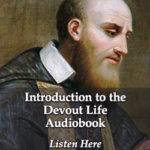

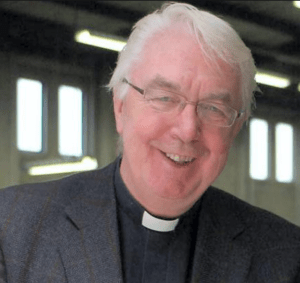 Fr. Vincent Twomey – The Dynamics of Liturgy, Part 2 on Inside the Pages w/ Kris McGregor
Fr. Vincent Twomey – The Dynamics of Liturgy, Part 2 on Inside the Pages w/ Kris McGregor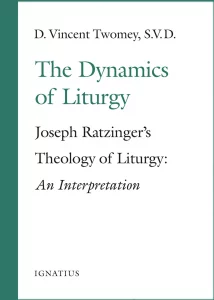 You can find the book
You can find the book 



 From the book of St. Luke 1:26-38
From the book of St. Luke 1:26-38
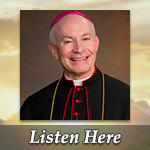
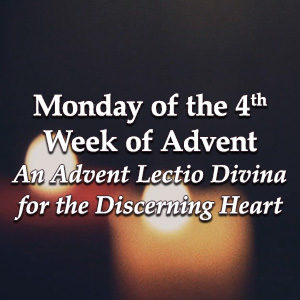 From the book of St. Luke 1:5-25
From the book of St. Luke 1:5-25